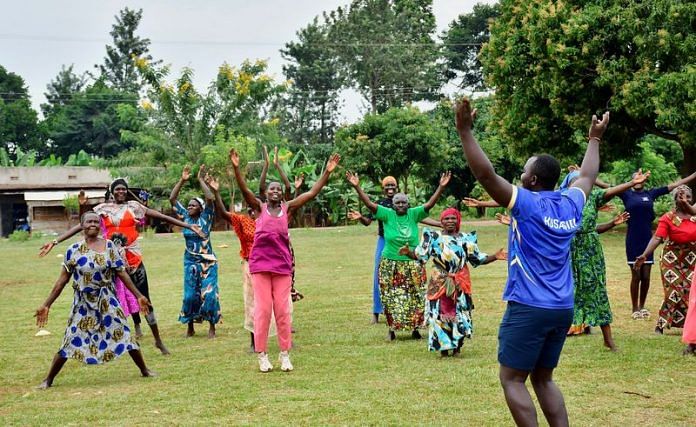JINJA, Uganda (Reuters) -Wearing floor-length dresses and wrap-around skirts, the group of elderly women giggle and tease each other as they jog in pairs, hand in hand, across a playing field in Kivubuka, a village in eastern Uganda.
The exercise class is part of a project aimed at reducing increasing rates of noncommunicable diseases such as hypertension, diabetes and heart disease and has attracted more than 1,000 people since it began five years ago.
While famine and malnutrition remain major concerns in several African countries, obesity is increasingly on the march, especially among Ugandan women.
Jane Anonyaalaba, a grandmother, is one of those looking to buck the trend. She used to struggle with high blood pressure, persistent aches and occasional paralysis in her limbs.
“I would breathe with difficulty. Climbing a hill was almost impossible,” the 70-year-old said.
Now, she bends over double to whack three tennis balls with a cricket bat before running between a set of blue plastic wickets.
A quarter of a century ago, just 4% of Ugandan women were obese, but that figure had more than doubled to 10.4% by 2019, according to the latest available dataset provided by the Global Nutrition Report, which tracks global nutrition.
By comparison, male obesity had risen to just 2.3%.
Weekly fitness clubs like Kivubuka may be a model for a local, low-cost approach to supporting aging communities across Africa, where 17% of adult women and 6.8% of men are obese.
As people lead more urban, sedentary lifestyles, and eat cheaper ultra-processed foods, the continent is becoming more obese, according to the World Health Organization (WHO).
Obesity has brought a corollary rise in deaths: around one-third of Ugandans died from NCDs in 2016, almost double the number in 2000.
“I want to think and believe that there (has been) a change in their lives,” said Isaac Imaka, who organises the club on behalf of the Gabula Royal Foundation, a charity established by a Ugandan traditional leader.
“This… is a place where you can come and find a new friend, and just have something to talk about.”
(Reporting by Elias Biryabarema; Editing by Hereward Holland and Alexandra Hudson)
Disclaimer: This report is auto generated from the Reuters news service. ThePrint holds no responsibility for its content.




